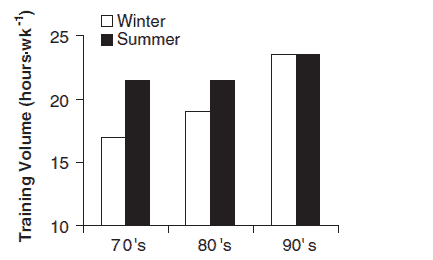This is a retrospective study conducted by Fiskerstrand and Seiler (2004) to ascertain the key training and performance characteristics of Norwegian elite rowers.
During 1970 to 2001, 28 male Norwegian rowers won 34 medals (11 gold, 15 silver, 8 bronze) in European, World or Olympic Championships. Physiological data were available for all 28 athletes; a training history survey was answered by 21 athletes.
The results indicate three main changes in training.
- Annual training volume has increased ~20% (from 924 to 1128 h·yr-1).
- More emphasis was put on training intensities below the first lactate turn point (< 2 mmol/l; from 30 h to 50 h·month-1). Training at high intensities (105%-115% VO2max; ~ 8–14 mmol/l lactate) was decreased from 23 to ~7 h·month-1.
- Altitude training (14-21 days at ~2000 m) has become a common practice, although no documentation is found of the benefits of this type of training on well-trained athletes.
What to learn from this?
More emphasis is put on preparatory season – more low intensity work is introduced. Elite Norwegian rowers have adopted a polarized training model where 75% of training is well below the lactate threshold and 15-20% well above that intensity level.


Source
Fiskerstrand Å, Seiler KS. Training and performance characteristics among Norwegian International Rowers 1970–2001. Scandinavian Journal of Medicine & Science in Sports 2004; 14: 303-310.
